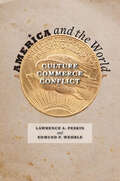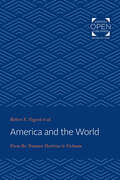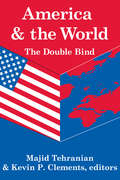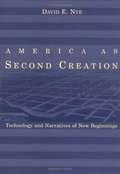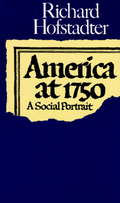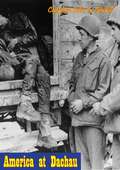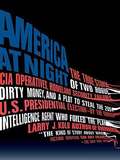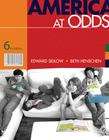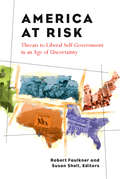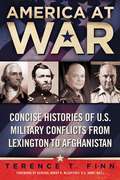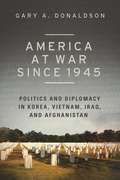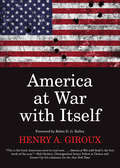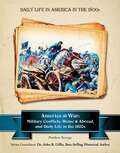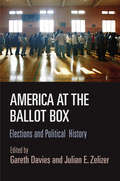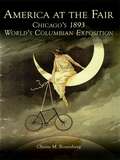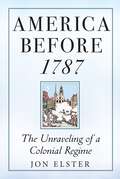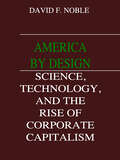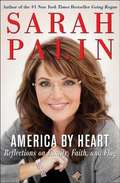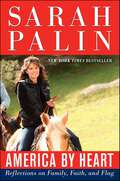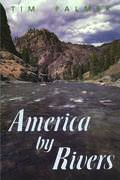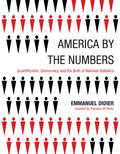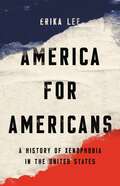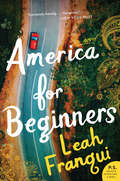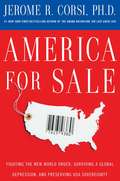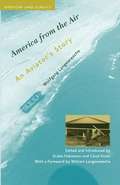- Table View
- List View
America and the World: Culture, Commerce, Conflict
by Edmund F. Wehrle Lawrence A. PeskinAlthough the twenty-first century may well be the age of globalization, this book demonstrates that America has actually been at the cutting edge of globalization since Columbus landed here five centuries ago.Lawrence A. Peskin and Edmund F. Wehrle explore America's evolving connections with Europe, Africa, and Asia in the three areas that historically have been indicators of global interaction: trade and industry, diplomacy and war, and the "soft" power of ideas and culture. Framed in four chronological eras that mark phases in the long history of globalization, this book considers the impact of international events and trends on the American story as well as the influence America has exerted on world developments. Peskin and Wehrle discuss how the nature of this influence—whether economic, cultural, or military—fluctuated in each period. They demonstrate how technology and disease enabled Europeans to subjugate the New World, how colonial American products transformed Europe and Africa, and how post-revolutionary American ideas helped foment revolutions in Europe and elsewhere. Next, the authors explore the American rise to global economic and military superpower—and how the accumulated might of the United States alienated many people around the world and bred dissent at home. During the civil rights movement, America borrowed much from the world as it sought to address the crippling "social questions" of the day at the same time that Americans—especially African Americans—offered a global model for change as the country strove to address social, racial, and gender inequality. Lively and accessible, America and the World draws on the most recent scholarship to provide a historical introduction to one of today's vital and misunderstood issues.
America and the World: From the Truman Doctrine to Vietnam
by Robert E. OsgoodOriginally published in 1970. This volume presents a study of American foreign policy during the Cold War period, investigating the United States' involvement with the U.S.S.R., China, and communist parties throughout the world.
America and the World: Volume 9, Peace and Policy
by Majid Tehranian Kevin P. ClementsAs the world's first democracy with a written constitution and Bill of Rights, the United States has stood for global aspirations toward democratic liberty, equality, and solidarity since its formation in 1776. However, as it developed into an empire by the late nineteenth century, the United States also has threatened the liberties of other peoples, including Native Americans, Hawaiians, Latin Americans, Asians, and Africans. The American role in world affairs has long been polarized around two conflicting images and strategies. In the name of counter-terrorism, the Bush administration pursued a largely unilateralist policy in the Middle East and elsewhere. Yet, in the name of protecting its national sovereignty, the United States also has rejected most of the recent multilateral treaties that strive to contain violence by fortifying the rule of international law. A unilateralist strategy also goes largely against the U.S. postwar multilateralism, which established the United Nations and its specialized agencies. This volume explores these contradictions. Contributors include: Kevin P. Clements, Tom Coffman, Audrey Kitagawa, Jeffrey F. Addicott, Steven Zunes, Vivien Stewart, Kathy Ferguson, Phyllis Turnbull, Bilveer Singh, Ibrahim G. Aoude, Richard Falk, Ann Wright, Beverley Kleever, Linda Groff, George Kent, Majid Tehranian, Mohammad Ali, Terrence Paupp, Gillian Young, Mihay Simaii, and David Krieger. The annual publication Peace & Policy, sponsored by the Toda Institute for Global Peace and Policy Research, is now in its ninth year. It is dedicated to providing a forum for the discussion of all issues concerning peace, policy, and the rights and responsibilities of global citizenship. This latest volume fulfills that commitment.
America as Second Creation: Technology and Narratives of New Beginnings
by David E. NyeAfter 1776, the former American colonies began to reimagine themselves as a unified, self-created community. Technologies had an important role in the resulting national narratives, and a few technologies assumed particular prominence. Among these were the axe, the mill, the canal, the railroad, and the irrigation dam. In this book David Nye explores the stories that clustered around these technologies. In doing so, he rediscovers an American story of origins, with America conceived as a second creation built in harmony with God's first creation. While mainstream Americans constructed technological foundation stories to explain their place in the New World, however, marginalized groups told other stories of destruction and loss. Native Americans protested the loss of their forests, fishermen resisted the construction of dams, and early environmentalists feared the exhaustionof resources. A water mill could be viewed as the kernel of a new community or as a new way to exploit labor. If passengers comprehended railways as part of a larger narrative about American expansion and progress, many farmers attacked railroad land grants. To explore these contradictions, Nye devotes alternating chapters to narratives of second creation and to narratives of those who rejected it. Nye draws on popular literature, speeches, advertisements, paintings, and many other media to create a history of American foundation stories. He shows how these stories were revised periodically, as social and economic conditions changed, without ever erasing the earlier stories entirely. The image of the isolated frontier family carving a homestead out of the wilderness with an axe persists to this day, alongside later images and narratives. In the book's conclusion, Nye considers the relation between these earlier stories and such later American developments as the conservation movement, narratives of environmental recovery, and the idealization of wilderness.
America at 1750
by Richard HofstadterDemonstrates how the colonies developed into the first nation created under the influences of nationalism, modern capitalism and Protestantism.From the Paperback edition.
America at Dachau
by Chaplain John G. GaskillHarrowing account of U.S. Army chaplain John G. Gaskill of what he witnessed in Dachau.For three months, Gaskill ministered to liberated inmates and imprisoned SS soldiers at Dachau. Every evening for a month, Gaskill and other clergymen held mass funerals for those who died from starvation and disease. Gaskill tore down and kept the German sign forbidding entry to a mass grave on a hill. He replaced it with a cross and a Jewish star. He eventually made German prisoners bury the dead in separate graves in the cemeteries in town."At incredible Dachau, Chaplain Gaskill arranged for all the multitudinous services of the Ministry and Priesthood to be performed as necessary for many denominations in many different tongues. Although much has already been written about Dachau, this article, giving the experiences and observations of Chaplain Gaskill, paints an exceptionally vivid picture and presents it in a different light.--AUBREY L. BRADFORD Colonel MC Commanding."
America at Night
by Larry J. KolbA shocking true account only one man can tell, "the kind. . . about which fiction writers can only dream. "--New York Times When the Department of Homeland Security suspects that two former CIA operatives are at the center of plot involving money laundering and the funding of Al Qaeda-and when their supposedly comprehensive database turns up little to no information on either man-it takes onetime spy Larry Kolb to crack the case. But when Kolb begins to connect the dots, he realizes something even more sinister is afoot, and that he's on to the biggest possible con with the highest political stakes. America at Nightreads like a thriller, but the story is true and extensively documented. Kolb shows us how one well-informed individual did what all of our security agencies could not: trail two brilliant covert political operatives through a labyrinth of disguised identities and dark crimes to expose corruption at the highest levels.
America at Odds (6th Edition)
by Beth Henschen Edward SidlowKnown for its provocative and engaging issues approach, AMERICA AT ODDS, 6e, now features a groundbreaking new magazine-style format that greatly enhances its visual appeal and readability while remaining affordable and convenient. This unique text provides a memorable and effective introduction to American government by focusing on the current and historical conflicts and controversies that define America as a nation. AMERICA AT ODDS combines compelling content, innovative design elements, and powerful teaching tools to help you discover and refine your opinions through active discussion and debate of essential topics in American government and politics.
America at Risk: Threats to Liberal Self-Government in an Age of Uncertainty
by Robert Faulkner Susan ShellAmerica at Riskgathers original essays by a distinguished and bipartisan group of writers and intellectuals to address a question that matters to Americans of every political persuasion: what are some of the greatest dangers facing America today? The answers, which range from dwindling political participation to rising poverty, and religion to empire, add up to a valuable and timely portrait of a particular moment in the history of American ideas. While the opinions are many, there is a central theme in the book: the corrosion of the liberal constitutional order that has long guided the country at home and abroad. The authors write about the demonstrably important dangers the United States faces while also breaking the usual academic boundaries: there are chapters on the family, religious polarization, immigration, and the economy, as well as on governmental and partisan issues. America at Riskis required reading for all Americans alarmed about the future of their country. Contributors Traci Burch James W. Ceaser Robert Faulkner Niall Ferguson William A. Galston Hugh Heclo Pierre Manent Harvey C. Mansfield Peter Rodriguez Kay Lehman Schlozman Susan Shell Peter Skerry James Q. Wilson Alan Wolfe Robert Faulkner is Professor of Political Science at Boston College. Susan Shell is Professor of Political Science at Boston College. "America at Riskgoes well beyond the usual diagnoses of issues debated in public life like immigration, war, and debt, to consider the Republic’s founding principles, and the ways in which they have been displaced by newer thoughts and habits in contemporary America. A critical book for understanding our present condition. " -Francis Fukuyama, Bernard L. Schwartz Professor of International Political Economy, Johns Hopkins School of Advanced International Studies "In this penetrating book, the nation’s finest social and political thinkers from across the spectrum take a careful and no-holds-barred look at the dangers facing the American political system. The conclusions are more unsettling than reassuring---but that is because they are honest and real. " -Norm Ornstein, Resident Scholar, American Enterprise Institute "In the midst of overwrought pundits, irate soccer moms, and outraged bloggers, it is difficult to distinguish genuine dangers from false alarms and special pleading. This book enables us to do so, in a way that helps us to actually think about, not just feel anxious about, threats to those features of American society that are worth cherishing. The authors range in ideology and expertise, but they are uniformly judicious, incisive, and informative. This is a fascinating book about issues that the political system usually ignores or exaggerates. " -Jennifer L. Hochschild, Henry LaBarre Jayne Professor of Government and Professor of African and African American Studies, Harvard University
America at War
by Terence T. FinnWar--organized violence against an enemy of the state--seems part and parcel of the American journey. Indeed, the United States was established by means of violence as ordinary citizens from New Hampshire to Georgia answered George Washington's call to arms. Since then, war has become a staple of American history. Counting the War for Independence, the United States has fought the armed forces of other nations at least twelve times, averaging a major conflict every twenty years. In so doing, the objectives have been simple: advance the cause of freedom, protect U.S. interests, and impose America's will upon a troubled world. More often than not, the results have been successful as America's military has accounted itself well. Yet the cost has been high, in both blood and treasure. Americans have fought and died around the globe--on land, at sea, and in the air. Without doubt, their actions have shaped the world in which we live. In this comprehensive collection, Terence T. Finn provides a set of narratives--each concise and readable--on the twelve major wars America has fought. He explains what happened, and why such places as Saratoga and Antietam, Manila Bay and Midway are important to an understanding of America's past. Readers will easily be able to brush up on their history and acquaint themselves with those individuals and events that have helped define the United States of America.
America at War since 1945: Politics and Diplomacy in Korea, Vietnam, Iraq, and Afghanistan
by Gary A. DonaldsonFocusing primarily on politics and foreign policy, America at War since 1945 analyzes America's involvement in its several wars since the end of World War II. The main questions asked are: How did the U.S. become involved in these wars? How were the wars conducted? And how did the U.S. get out of these wars?In Korea and Vietnam, the US fought to show the world that it would stand up to the evils of communism-that it could be counted on (with money, advisors, or even a major military effort if necessary) to halt the advance of communism. But in both wars, the US showed itself to be militarily vulnerable. In its wars against radical Islam since 9/11, the United States has made use of its military to protect its interests in the Middle East, particularly its oil interests, while trying to spread its ideas of democracy, constitutionalism, and the rule of law. The lessons are clear: America's values often do not translate into the less-developed world.In 2016, as the debate over ISIS intensifies, America at War since 1945 reminds us that the history of US postwar military conflict has seldom been marked by clearly defined goals and outcomes. Skyhorse Publishing, as well as our Arcade imprint, are proud to publish a broad range of books for readers interested in history--books about World War II, the Third Reich, Hitler and his henchmen, the JFK assassination, conspiracies, the American Civil War, the American Revolution, gladiators, Vikings, ancient Rome, medieval times, the old West, and much more. While not every title we publish becomes a New York Times bestseller or a national bestseller, we are committed to books on subjects that are sometimes overlooked and to authors whose work might not otherwise find a home.
America at War with Itself
by Henry A. Giroux Robin D.G. KelleyFrom poisoned water and police violence in our cities, to gun massacres and hate-mongering on the presidential campaign trail, evidence that America is at war with itself is everywhere around us. The question is not whether or not it's happening, but how to understand the forces at work in order to prevent conditions from getting worse. Henry A. Giroux offers a powerful, far-reaching critique of the economic interests, cultural dimensions, and political dynamics involved in the nation's shift toward increasingly abusive forms of power. His analysis helps us to frame critical questions about what can and should be done to turn things around while we can.Reflecting on a wide range of social issues, Giroux contrasts Donald Trump's America with Sandra Bland's to understand who really benefits from politically fueled intolerance for immigrants, communities of color, Muslims, low-income families, and those who challenge state and corporate power. A passionate advocate for civil rights and the importance of the imagination, Giroux argues that only through widespread social investment in democracy and education can the common good hope to prevail over the increasingly concentrated influence of extreme right-wing politicians and self-serving economic interests.Praise for America at War with Itself:"This is the book Americans need to read now. No one is better than Henry Giroux at analyzing the truly dangerous threats to our society. He punctures our delusions and offers us a compelling and enlightened vision of a better way. America at War with Itself is the best book of the year."-Bob Herbert, Distinguished Senior Fellow at Demos and former Op-Ed columnist for the New York Times"In America at War with Itself, Henry Giroux again proves himself one of North America's most clear-sighted radical philosophers of education, culture and politics: radical because he discards the chaff of liberal critique and cuts to the root of the ills that are withering democracy. Giroux also connects the dots of reckless greed, corporate impunity, poverty, mass incarceration, racism and the co-opting of education to crush critical thinking and promote a culture that denigrates and even criminalizes civil society and the public good. His latest work is the antidote to an alarming tide of toxic authoritarianism that threatens to engulf America. The book could not be more timely."-Olivia Ward, Toronto Star"The current U.S. descent into authoritarianism did not just happen. As Henry Giroux brilliantly shows it was the result of public pedagogical work in a number of institutions that were part of a long-standing assault on public goods, the social contract, and democracy itself. Giroux powerfully skewers oppressive forces with the hallmark clarity and rigor that has made him one of the most important cultural critics and public intellectuals in North America. His sharp insights provide readers with the intellectual tools to challenge the tangle of fundamentalisms that characterize the political system, economy, and culture in the current conjuncture. America at War with Itself makes the case for real ideological and structural change at a time when the need and stakes could not be greater. Everyone who cares about the survival and revival of democracy needs to read this book."-Kenneth Saltman, Professor, University of Massachusetts Dartmouth, Author of The Failure of Corporate School ReformHenry A. Giroux's most recent books include The Violence of Organized Forgetting and America's Addiction to Terrorism. A prolific writer and political commentator, he has appeared in a wide range of media, including the New York Times and Bill Moyers.
America at War: Military Conflicts, Home and Abroad, and Daily Life in the 1800 (Daily Life in America in the 1800s)
by Matthew StrangeFrom an isolated and inward-looking new nation clinging to the East Coast, America in the 1800s grew in size, strength, and military might. From the War of 1812 to the century-long campaigns of conquest against Native American peoples, territorial expansion through war with Mexico to the great national tragedy that was the Civil War, American soldiers and sailors forged a tradition of pride and heroism that is part of our national heritage. Sometimes misguided, sometimes truly inspired, nineteenth-century America produced some of the greatest military leaders and witnessed some of the bloodiest battles in our history. Behind the scenes, and often neglected in our official histories, the life of America's citizen soldiers was a tough and brutal one. Patriotism, heroism, and human folly all combine in the story of the roots of America's rise to the status of world military power.
America at the Ballot Box
by Julian E. Zelizer Gareth DaviesElections are, and always have been, the lifeblood of American democracy. Often raucous and sharply contentious, sometimes featuring grand debates about the nation's future, and invariably full of dramatic moments, elections offer insight into the character and historical evolution of American politics. America at the Ballot Box uses the history of presidential elections to illuminate American political democracy and its development from the early Republic to the late twentieth century.Some of the contributions in America at the Ballot Box focus on elections that resulted in dramatic political change, including Jefferson's defeat of Adams in 1800, the 1860 election of Lincoln, and Reagan's 1980 landslide victory. Others concentrate on contests whose importance lies more in the way they illuminate the broad, underlying processes of political change, such as the corruption controversy of Cleveland's acrimonious election in 1884 or the advent of television advertising during the 1952 campaign, when Eisenhower defeated Stevenson. Another set of essays takes a thematic approach, exploring the impact of foreign relations, Anglophobia, and political communications over long periods of electoral time. Uniting all of the chapters is the common conviction that elections provide a unique vantage point from which to view the American political system.Ranging from landmark contests to less influential victories and defeats, the essays by leading political historians seek to rehabilitate the historical significance of presidential elections and integrate them into the broader evolution of American government, policies, and politics.Contributors: Brian Balogh, Gareth Davies, Meg Jacobs, Richard R. John, Kevin M. Kruse, Jeffrey L. Pasley, Andrew Preston, Elizabeth Sanders, Bruce J. Schulman, Jay Sexton, Adam I. P. Smith, Sean Wilentz, Julian E. Zelizer
America at the Fair: Chicago's 1893 World's Columbian Exposition
by Chaim M. RosenbergAt the time of the World's Columbian Exposition of 1893, the United States was fast becoming the world's leading economy. Chicago, the host city, had grown in less than half a century from a village to the country's second-largest metropolis. During this, the Gilded Age, the world's most extensive railroad and steamship networks poured ceaselessly through Chicago, carrying the raw goods and finished products of America's great age of invention and industrial expansion. The Fair was the largest ever at the time, with 65,000 exhibitors and millions of visitors. It has been called the "Blueprint of the American Future" and marked the beginning of the national economy and consumer culture.
America before 1787: The Unraveling of a Colonial Regime
by Jon ElsterAn original account, drawing on both history and social science, of the causes and consequences of the American RevolutionWith America before 1787, Jon Elster offers the second volume of a projected trilogy that examines the emergence of constitutional politics in France and America. Here, he explores the increasingly uneasy relations between Britain and its American colonies and the social movements through which the thirteen colonies overcame their seemingly deep internal antagonisms.Elster documents the importance of the radical uncertainty about their opponents that characterized both British and American elites and reveals the often neglected force of enthusiasm, and of emotions more generally, in shaping beliefs and in motivating actions. He provides the first detailed examinations of &“divide and rule&” as a strategy used on both sides of the Atlantic and of the rise and fall of collective action movements among the Americans. Elster also explains how the gradual undermining in America of the British imperial system took its toll on transatlantic relations and describes how state governments and the American Confederation made crucial institutional decisions that informed and constrained the making of the Constitution.Drawing on a wide range of historical sources and on theories of modern social science, Elster brings together two fields of scholarship in innovative and original ways. The result is a unique synthesis that yields new insights into some of the most important events in modern history.
America by Heart: Reflections on Family, Faith, and Flag
by Sarah PalinIn the fall of 2009, with the publication of her #1 national bestselling memoir, Sarah Palin had the privilege of meeting thousands of everyday Americans on her extraordinary 35-city book tour. Inspired by these encounters, her new book, America By Heart: Reflections on Family, Faith, and Flag, celebrates the enduring strengths and virtues that have made this country great. Framed by her strong belief in the importance of family, faith, and patriotism, the book ranges widely over American history, culture, and current affairs, and reflects on the key values-both national and spiritual-that have been such a profound part of Governor Palin's life and continue to inform her vision of America's future. Written in her own refreshingly candid voice, America By Heart will include selections from classic and contemporary readings that have moved her-from the nation's founding documents to great speeches, sermons, letters, literature and poetry, biography, and even some of her favorite songs and movies. Here, too, are portraits of some of the extraordinary men and women she admires and who embody her deep love of country, her strong rootedness in faith, and her profound love and appreciation of family. She will also draw from personal experience to amplify these timely (and timeless) themes-themes that are sure to inspire her numerous fans and readers all across the country.
America by Heart: Reflections on Family, Faith, and Flag
by Sarah PalinIn the fall of 2009, with the publication of her #1 national bestselling memoir, Sarah Palin had the privilege of meeting thousands of everyday Americans on her extraordinary 35-city book tour. Inspired by these encounters, her new book, America By Heart: Reflections on Family, Faith, and Flag, celebrates the enduring strengths and virtues that have made this country great.Framed by her strong belief in the importance of family, faith, and patriotism, the book ranges widely over American history, culture, and current affairs, and reflects on the key values—both national and spiritual-that have been such a profound part of Governor Palin’s life and continue to inform her vision of America’s future. Written in her own refreshingly candid voice, America By Heart will include selections from classic and contemporary readings that have moved her-from the nation’s founding documents to great speeches, sermons, letters, literature and poetry, biography, and even some of her favorite songs and movies. Here, too, are portraits of some of the extraordinary men and women she admires and who embody her deep love of country, her strong rootedness in faith, and her profound love and appreciation of family. She will also draw from personal experience to amplify these timely (and timeless) themes—themes that are sure to inspire her numerous fans and readers all across the country.
America by Rivers
by Tim PalmerPhotographer and writer Tim Palmer has spent more than 25 years researching and experiencing life on the waterways of the American continent. He has travelled by canoe or raft on more than 300 different rivers, down wide placid streams and rough raging rapids. His journeys have taken him to every corner of the country, where he has witnessed and described the unique interaction of geographical, historical, and cultural forces that act upon our nation's vital arteries.America by Rivers represents the culmination of that grand adventure. Palmer describes the rivers of America in all their remaining glory and tarnished beauty, as he presents a comprehensive tour of the whole of America's river systems. Filled with important new information as well as data gathered from hundreds of published sources, America by Rivers covers: the network of American waterways and how they fit together to form river systems unique features of individual rivers along with their size, length, and biological importance environmental problems affecting the rivers of different regions and what is being done to protect and restore them cultural connections and conflicts surrounding the rivers of each region Chapters address the character of rivers in distinct regions of the country, and each chapter highlights one river with a detailed view from the water. Rivers profiled include the Penobscot, Potomac, Suwanee, Minnesota, Niobara, Salmon, Rio Grande, American, Rogue, and Sheenjek. Eighteen maps guide the reader across the country and 100 photos illustrate the splendor of Palmer's fascinating subject.America by Rivers provides a new way of seeing our country, one that embraces the entire landscape and offers fresh avenues to adventure. It is compelling reading for anyone concerned about the health of our land and the future of our waterways.
America by the Numbers: Quantification, Democracy, and the Birth of National Statistics (Infrastructures)
by Emmanuel DidierHow new techniques of quantification shaped the New Deal and American democracy.When the Great Depression struck, the US government lacked tools to assess the situation; there was no reliable way to gauge the unemployment rate, the number of unemployed, or how many families had abandoned their farms to become migrants. In America by the Numbers, Emmanuel Didier examines the development in the 1930s of one such tool: representative sampling. Didier describes and analyzes the work of New Deal agricultural economists and statisticians who traveled from farm to farm, in search of information that would be useful for planning by farmers and government agencies. Didier shows that their methods were not just simple enumeration; these new techniques of quantification shaped the New Deal and American democracy even as the New Deal shaped the evolution of statistical surveys.Didier explains how statisticians had to become detectives and anthropologists, searching for elements that would help them portray America as a whole. Representative surveys were one of the most effective instruments for their task. He examines pre-Depression survey techniques; the invention of the random sampling method and the development of the Master Sample; and the application of random sampling by employment experts to develop the “Trial Census of Unemployment.”
America for Americans: A History of Xenophobia in the United States
by Erika LeeAn award-winning historian reframes our continuing debate over immigration with a compelling history of xenophobia in the United States and its devastating impactThe United States is known as a nation of immigrants. But it is also a nation of xenophobia. In America for Americans, Erika Lee shows that an irrational fear, hatred, and hostility toward immigrants has been a defining feature of our nation from the colonial era to the Trump era. Benjamin Franklin ridiculed Germans for their "strange and foreign ways." Americans' anxiety over Irish Catholics turned xenophobia into a national political movement. Chinese immigrants were excluded, Japanese incarcerated, and Mexicans deported. Today, Americans fear Muslims, Latinos, and the so-called browning of America. Forcing us to confront this history, America for Americans explains how xenophobia works, why it has endured, and how it threatens America. It is a necessary corrective and spur to action for any concerned citizen.
America for Beginners: A Novel
by Leah FranquiRecalling contemporary classics such as Americanah, Behold the Dreamers, and The Brief Wondrous Life of Oscar Wao, a funny, poignant, and insightful debut novel that explores the complexities of family, immigration, prejudice, and the American Dream through meaningful and unlikely friendships forged in unusual circumstances.Pival Sengupta has done something she never expected: she has booked a trip with the First Class India USA Destination Vacation Tour Company. But unlike other upper-class Indians on a foreign holiday, the recently widowed Pival is not interested in sightseeing. She is traveling thousands of miles from Kolkota to New York on a cross-country journey to California, where she hopes to uncover the truth about her beloved son, Rahi. A year ago Rahi devastated his very traditional parents when he told them he was gay. Then, Pival’s husband, Ram, told her that their son had died suddenly—heartbreaking news she still refuses to accept. Now, with Ram gone, she is going to America to find Rahi, alive and whole or dead and gone, and come to terms with her own life.Arriving in New York, the tour proves to be more complicated than anticipated. Planned by the company’s indefatigable owner, Ronnie Munshi—a hard-working immigrant and entrepreneur hungry for his own taste of the American dream—it is a work of haphazard improvisation. Pival’s guide is the company’s new hire, the guileless and wonderfully resourceful Satya, who has been in America for one year—and has never actually left the five boroughs. For modesty’s sake Pival and Satya will be accompanied by Rebecca Elliot, an aspiring young actress. Eager for a paying gig, she’s along for the ride, because how hard can a two-week "working" vacation traveling across America be?Slowly making her way from coast to coast with her unlikely companions, Pival finds that her understanding of her son—and her hopes of a reunion with him—are challenged by her growing knowledge of his adoptive country. As the bonds between this odd trio deepens, Pival, Satya, and Rebecca learn to see America—and themselves—in different and profound new ways.A bittersweet and bighearted tale of forgiveness, hope, and acceptance, America for Beginners illuminates the unexpected enchantments life can hold, and reminds us that our most precious connections aren’t always the ones we seek.
America for Sale
by Jerome R CorsiA RESOUNDING CALL TO DEFEND AMERICA'S SOVEREIGNTY AND SAVE OUR NATION FROM GLOBAL ECONOMIC TAKEOVER-- FROM THE #1 NEW YORK TIMES BESTSELLING AUTHOR OF THE OBAMA NATION AND THE LATE GREAT US Between George H. W. Bush's "new world order" and the unprecedented governmental growth and massive redistribution of wealth under President Barack Obama, the United States risks losing the greatest middle class ever created in the history of the world. In this groundbreaking New York Times bestseller, Dr. Jerome R. Corsi blows the whistle on a movement to undercut the fundamental principles of limited government that our Founding Fathers fought for and died for trying to establish. While the radical Left promotes socialism and the radical Right champions unbridled free trade, valuable jobs are being outsourced, our national borders erased, and our dollar destroyed before our very eyes. With constructive solutions for resisting the global New Deal, reversing our dependence on foreign oil, and strengthening our middle class, Corsi shares important and practical strategies to help American families survive. The United States can be a major player in the world economy without sacrificing our sovereignty, the strength of our national domestic economy, or the dollar. America is for sale--unless taxpayers stand up and say "NO!" to the globalist political agenda that threatens our great nation's freedom. m.
America from the Air: An Aviator's Story
by Wolfgang LangewiescheA memoir of a pilot who learned to fly in the 1930's as well as a look at America from the air as it appeared in the 1940's. At the same time it is a study of the joys of flying.
